Leaders: Reality bites as Paris talks show progress


All eyes are again fixed on Paris as world leaders attempt to hammer out a treaty to combat what has been described as the biggest threat faced by mankind.
Almost 200 countries have submitted pledges to curb greenhouse gas emissions as part of negotiations towards an international deal to restrict global warming to internationally agreed “safe” levels. As the United Nations summit approaches its closing stages, hopes remain high that an agreement can be reached.
Advertisement
Hide AdAdvertisement
Hide AdWhether or not efforts to restrict emissions can actually achieve the goal of limiting global temperature rises to 2C is debatable, but it is crucial that we all try. And the Paris talks represent a major step in the right direction.
It is heartening to see countries – both rich and poor – sitting together round the negotiating table, willing to discuss our global dilemma.
And progress is being made. It may have taken the best part of a fortnight, but determined bargaining has seen the draft agreement hacked down to a manageable 29 pages.
We have also seen the creation of an informal “high ambition coalition” of more than 100 developed and developing countries that share a commitment to even tougher climate goals, including an aim to restrict warming to 1.5C by 2100.
This in itself is a positive step, and sends a clear message acknowledging the seriousness of the planet’s predicament and our part in it.
So far, so good. However, there remain a couple of stumbling blocks before an agreement can be reached. One is “differentiation”, which sees countries having varying levels of responsibilities and actions depending on their status. Some developing nations argue that they should be let off emissions curbs until they reach a certain economic standing, since Western countries were able to power their progress with fossil fuels.
This is unrealistic and unhelpful. Early industrialists shovelled coal without a clue to the consequences. That they gained an economic advantage is now history. We have to address the situation as it stands now, however unfair that seems.
As always, the other major hurdle is money. Who is going to pay, how much and to whom?
Advertisement
Hide AdAdvertisement
Hide AdIt is right that the richest countries should put their hands in their pockets to help poorer ones, especially since it is some of the most vulnerable nations that are already experiencing increasingly severe impacts of climate change.
But cash should not be dished out without guarantees. Funding must be proportionate and fully transparent. Countries receiving support would have to account for it, with heavy penalties for misuse of financial support or failure to comply with green obligations.
It is also time for the planet’s biggest polluters to make their actions speak as loudly as their words and turn away completely from oil, coal and gas. The focus of innovation and investment must be turned to renewable, low-carbon technologies.
If this new coalition, which includes the UK and the US, is to achieve anything more than tough talk and big ideas, countries must lead by example and demand the rest should follow.
Integrity worth more than Hopkins
If patriotism is the last refuge of the scoundrel, then referencing Katie Hopkins to validate your opinions must be the last refuge of the damned.
Donald Trump came out fighting yesterday after widespread criticism of his call for Muslims to be banned from entering the United States. “Look what I’ve done for Scotland – you should be more grateful (you hicks)” was the gist of it. From an individual with an ego the size of his 68-storey Trump Tower, this isn’t a surprise. It’s what we have come to expect ever since Trump arrived here ten years ago to build the “world’s greatest” golf course in Aberdeenshire.
Where Trump did catch the eye yesterday was by thanking the “respected columnist” Katie Hopkins” for her “powerful writing on the UK’s Muslim problem”. As one commentator put it, the devil has found his advocate.
Condemnation of Trump’s remarks has been international this week, but the booming one has not failed to notice that he was condemned here in Scotland by the First Minister, and has been stripped of an honorary degree by Robert Gordon University. We offer congratulations to Ms Sturgeon for her swift confirmation that a person holding such unpalatable views is no longer a credible business ambassador for Scotland, and to the university for distancing itself from an individual with opinions incompatible with its ethos and values.
Advertisement
Hide AdAdvertisement
Hide AdTrump believes putting his money where is mouth is – and that’s quite a feat – buys him the right to be listened to. He will never get this bit, but that approach is not going to work here.
It’s unfortunate that the relationship with a genuine entrepreneur, with bona fide Scottish credentials, has ended, but if Trump’s investment requires compromise, then it comes at too high a price. Our integrity is not for sale.